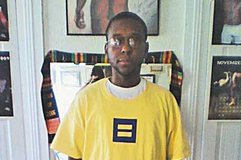Philadelphia native Reno Prestige Wright has been an active LGBT advocate for years and, with his newly published “Making Mr. Wright: Memoirs of a Black Female-to-Male Transsexual,” he is sharing his story of transition, faith and community work.
Wright, 40, said he knew he liked girls from a young age and came out as transgender at 21.
“Growing in North Philly was very difficult, especially as a member of the community and an African-American member of the community because you didn’t talk about this type of stuff, you didn’t talk about being gay and it was a huge taboo if you were,” he said. “You were encouraged violently to a certain extent to suppress those feelings. It was a very unwelcoming atmosphere.”
Wright was an avid reader as a child and often escaped from the challenges he faced by reading about historical figures like Harriet Tubman and Joan of Arc.
“Being into books and reading as a child was discouraged because in my neighborhood, females were not allowed to display any type of intelligence,” he said. “Everything I did was against what I was supposed to do, including reading, but I loved it. I got lost in the imagination, the history and the different time periods and, in my mind, I found reading would allow me to display and relate to persons who had the same behaviors that I dreamed of displaying.”
Wright said his own writing draws inspiration from the classic Harlem Renaissance writers such as Langston Hughes, James Baldwin and Zora Neale Hurston, as well as mainstream writers like Anne Rice.
“These are writers who are in the community, that are tortured souls and the only way to express themselves was through writing,” he said. “Anne Rice is also a remarkable spiritual writer and I was looking for so long for the perspective from which she writes. Her fiction is so real to me.”
Wright said he felt he had to publish his story, in part, to help bridge the gap between the LGBT and religious communities.
“In my culture, it is very discouraged to be LGBT and religious and most of our black churches are who we are; we are encouraged to be one way in the church and another way outside and that is hypocritical,” he said. “Being on the front lines of activism, many of us don’t have a relationship with God because that is how we are taught and raised: that God doesn’t love us, and that is a huge lie that drove me insane.”
The narrative focuses on 2007, when Wright was in a drug and alcohol rehabilitation process, through last year, when he says his life began to feel more complete.
Since the book was published, Wright said he has been approached by area universities, as well as members of his own church.
“I was at the Philadelphia Library at 28th and Lehigh and some members of my church actually attended and for those people to tell me that they felt a certain way about the community and the relationship with God, to change their minds, that is true power and that is the Lord telling me that spiritual warfare is what he wants me to do,” he said.
In addition to other writing projects, Wright is also working on creating a faith-based LGBT program.
“What I want to do is to take what I learned and teach it to other folks, but the main purpose is to change our minds and how we feel about ourselves and change our destructive behaviors and end our horrible tragedies in our community. If we present ourselves as role models, we can turn away from all of those things.”
